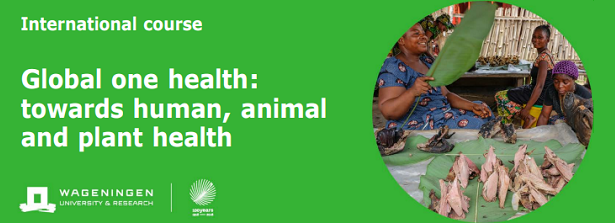
Wageningen Centre for Development Innovation (WCDI) organizes the international course “Global one Health: towards human, animal and plant health” in Wageningen from November 05 to 16, 2018.
In 2050 the world population will reach 9 billion. How can we produce and consume food whilst safeguarding our planet? How do we deal with (re)emergence of infectious diseases driven by urbanisation and globalisation? The Global One Health course highlights approaches towards human, animal and plant health using a transdisciplinary lens.
The concept of Global One Health (GOH)
GOH emphasizes the interdependence between human health, the health of animals, plants and sustainable ecosystems from a global perspective. True prosperity and security will only be reached if we weigh all possible effects of interventions on the health of humans, animals, plants and the environment, while taking ecosystem sustainability into account. The Global One Health approach uses multiple disciplines to seek transnational solutions for improving the health of humans, animals and plants, and ultimately, the sustainability of the ecosystems of planet earth. Central hereby is that the Global One Health approach does not primarily aim at cure of diseases but merely at the prevention of diseases and the promotion of health.
The two-week training programme
The training focuses on the different angles of Global One including the role of ecology and evolution, plant health, animal health, human health and food and nutrition security, epidemiology, economics. Different entry points for GOH action, policy and planning will be highlighted. This course has been developed by Wageningen Centre for Development Innovation and several Centres of Excellence within Wageningen University and Research, notably:
- Resource Ecology, Department of Environmental Sciences
- Business Economics and Health and Society; Department of Social Sciences
- Nutrition, Public Health and Sustainability, Department of Agrotechnology and Food Sciences
- Virology, Wageningen Bioveterinary Research
- Quantitative Veterinary Epidemiology, Department of Animal Sciences.
The course is at BSc level and open to international participants and mid-career professionals, those who are interested to learn more about (Global) One Health, and MSc students of Wageningen University. Course participants should preferably be active in one of the following fields: rural/urban/spatial planning, agribusiness development, livelihood governance, food and nutrition security and sustainable development, or other relevant areas. Several years of professional work experience and at least a BSc level are additional assets. Proficiency in English is a must.
Course objectives
The overall objective of this course is to introduce the participants to the principles behind a Global One Health approach and to be able to apply these principles to health challenges for humans, animals and plants in their day-to-day work. In particular:
- Participants understand about the scope of the topic GOH and its range of consequences at multiple levels and learn about the interrelatedness animal, human, plant and environmental health;
- Participants understand the concept of GOH, get familiar with applying different tools and feel equipped to perform GOH analysis;
- Participants learn about the ecological and economic relevance of GOH management;
- Participants get exposed to GOH practices in the Netherlands and are able to identify entry points for GOH policy, planning and management in their own country
- Participants are equipped to prepare an action plan to apply the acquired knowledge upon return in their home countries.
More information
For practical information, to download the factsheet and to register online, please visit the WCDI website.
- This event has passed.

